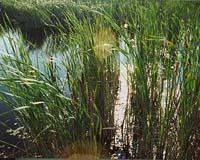| . |  |
. |
Washington (AFP) July 19, 2009 They may have lost fingers, or perhaps even an arm or leg, but these former surfers and vacationers paced down the halls of Congress in Washington to seek protection for sharks, their very attackers. "I'm here to lobby for the bill to save the sharks, I lost my arm. It's a very powerful statement," said Al Brenneca, a 52-year-old who was attacked by a shark in 1976 in Florida. Along with a group of eight other survivors brought together by the Pew Environment Group research center, Brenneca descended on Capitol Hill to lobby senators to pass a measure placing tough restrictions on shark fishing. More than a third of all shark species are endangered, in part due to finning, a practice in which a shark's fins are cut off before the body is thrown back into the water. Shark fin soup is a beloved delicacy in Asia, where it is in high demand. Some 70 million sharks die in the ocean each year. In contrast, shark attacks on humans are rare -- between 60 and 100 per year worldwide. "You might ask why considering I was attacked by a shark, why don't I want eat the sharks or kill them all?" quipped Krishna Thompson, a 44-year-old New York banker whose spectacular attack by a bull shark in 2001 during his 10-year wedding anniversary in the Bahamas had captured the media's attention. Fighting back with his bare hands, he finally freed himself from the steel-sharp jaws. "I had the leg but all I could see was the femur and tibia, no skin, no vein, no muscle and I remember seeing the white bones. And I thought, 'Oh man, I'm going to be amputated,'" he recalled. Now wearing an artificial limb and a T-shirt declaring his determination to defend the shark, Thompson has converted himself into an activist fighting for the survival of the predators. "What the shark did to me was what they are supposed to do," he insists. "Sharks have been around for 300 millions years -- before dinosaurs. They haven't changed much from then till now. He added that people should not mess with mother nature, and let the sharks be. "I don't want find out what life would be for us as human if they ceased to exist," Thompson stressed. "If we killed all the sharks that will have an effect on us as humans. That's why I'm here." Wednesday's demonstration in the Halls of Congress was unusual and startling even for veteran lawmakers who have seem many expressions of public sentiment. All described scenes of carnage at sea when the were forced to swim in their own blood to save their lives. Most have suffered cardiac arrest by the time they arrived to the hospital. Mike Coots, 30, from Hawaii was attacked by a tiger shark in 1997 when he was surfing in the morning. The predator grabbed him by the right leg, shook him back and forth while he was trying to fight back the attacker by punching it on the head. The shark released him went back into the deep water while Mike started paddling toward the shore. But his leg was gone. "I didn't feel it come off," he recalls. "It was gone. My friend took my surfing leash and made a tourniquet to stop the bleeding. Yeah. He saved my life." But Coots believes that he may have been bitten by a shark to help protect the species. "I feel very strongly that these animals have a place in the world," he insisted. "And without them, I think it's going to disrupt the entire ecosystem." But not everybody get over such life experiences. Brenneca, who lost his arm to a shark more than 30 years ago, says many people still harbor resentment toward these predators. "Some people can't get over their bite and stuff," he notes. "Some people still have an anger towards things whether it be sharks or their own stupidity. It takes years to really get over a bite like this, a serious bite where you lose your arm or you lose your leg. It takes a while to get over that."
Share This Article With Planet Earth
Related Links Darwin Today At TerraDaily.com
 EU report seeks action on biodiversity
EU report seeks action on biodiversityBrussels (UPI) Jul 15, 2009 The EU environment commissioner warned action is needed to save species and habitat types the have been placed under EU legal protection. Environment Commissioner Stavros Dimas, in a release issued Monday, said the overall tenor of the report on conservation status indicates habitats and species "have not achieved good conservation status." He added, however, protection steps are ... read more |
|
| The content herein, unless otherwise known to be public domain, are Copyright 1995-2009 - SpaceDaily. AFP and UPI Wire Stories are copyright Agence France-Presse and United Press International. ESA Portal Reports are copyright European Space Agency. All NASA sourced material is public domain. Additional copyrights may apply in whole or part to other bona fide parties. Advertising does not imply endorsement,agreement or approval of any opinions, statements or information provided by SpaceDaily on any Web page published or hosted by SpaceDaily. Privacy Statement |